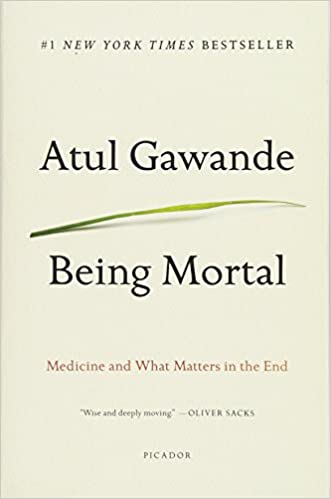How often do you criticize yourself for past mistakes? Or say things like, “I can’t forgive myself.”
“I don’t think I’ll ever be able to let go of these regrets.”
Everyone makes choices that fall outside of their character. It creates guilt that snowballs, creates despair, and is nearly impossible to walk off.
We suck at accepting the mistakes we made in the past because we see them as failures. But, what if we flipped the perspective?
What if our mistakes are learning opportunities that help us become the people we are today?

Being Mortal
by Atul Gawande
⏱ 14 minutes reading time
🎧 Audio version available
How to Approach the Idea of Acceptance and Self-Forgiveness
Think about the process as a transaction.
We often think of forgiveness as a transaction that happens between multiple parties. If the apology is sincere and a pardon granted, everything seems right with the world.
Self-forgiveness seems like a fictitious process when using that perspective. How can you complete a transaction with yourself?
That’s where the idea of learning from a mistake becomes beneficial. Although the past delivered regret, forgiveness is a transaction that helps you see how to avoid the same problem in the future.
Stop avoiding the problem.
We avoid the idea of acceptance for three specific reasons.
- We don’t want to think about the mistake that we made ever again.
- The circumstances were so far out of character that it makes you wonder what kind of person you actually are.
- There is a desire to avoid self-evaluation.
It feels productive to run from our problems. When all that energy gets put into avoidance, the grief, pain, and shame seem to vanish for a while.
The trouble with that coping method is that those emotions eventually return. By facing the issues instead of avoiding them, each one can be dealt with appropriately.
Stash the ego.
Self-forgiveness sometimes becomes problematic because there is a deep-seated narcissism channeling the emotions. In this case, the perception of not moving on is a higher view of oneself.
Since we cannot believe we’d make such a mistake, our self-esteem simply dismisses the notion that the mistake happened. Was it even a mistake?
Pride gets in the way of learning from our failures because it forces the ego to admit that something wrong happened. If you can stash it somewhere, you can evaluate the issues with an open mind, which allows you to learn from the mistake and be better.
Acceptance is different from desire.
We can’t always get the things we want in life. When a specific desire rules people, the failure to manifest that desire can feel like an unsolvable problem.
Even if we have good desires, like losing weight or getting more exercise, not getting it can become an obstacle to forgiveness and letting go.
Everyone needs something for safety, security, and significance. If people fail to get it, they wonder how life can continue.
That’s why these moments should be about acceptance. It is easier to process difficult circumstances when you see that life is manageable without what feels like “needs.”
Stop judging through the eyes of others.
When someone says that they cannot forgive themselves, what they are really saying is, “I have judged myself to be a failure.”
No one likes to be wrong. Once a declaration like that is made, it often becomes a repetitive, self-fulfilling prophecy.
Instead of judging your past choices, try to find what positive elements came from the situation. Did other people learn from your mistake, so that they could avoid it? Did you learn from your mistake?
By letting go of the judgment, you can focus on moving forward from what happened in the past. Everyone will form opinions, but the only thoughts you can control are your own.
You can be the change that lets the mistakes from the past go.
Stop living in denial about your circumstances.
Author Brennan Manning once told the story of a group therapy session at a detox program. One man was insistent that he hadn’t done anything wrong, but it turned out that he had badly hurt his daughter due to his drinking.
Manning said that the man convulsed on the floor after being confronted with the reality of what he’d done. Living in denial makes it more difficult to accept mistakes because we refuse to even acknowledge their existence.
Although it feels safer to live in fantasy worlds, our feet are always grounded in reality. We’re terrible at accepting this fact because no one wants to face painful circumstances.
Forgiveness is not saying a mistake wasn’t wrong. It isn’t even about forgetting the choice or pretending it didn’t happen.
When people stop living in denial, they gain hope for a better future than what they experienced in the past.
Focus on love for yourself and others first.
If you have screwed up, welcome to the club. You have a choice. Will you let that moment define your life, or are you willing to find the value of each moment?
You are not worthless.
Your worth is based on how you love yourself and others. When you look for new life lessons and learning opportunities in each painful memory, the circumstances won’t seem as bleak.
Are You Ready to Stop Sucking at Acceptance?
If guilt plagues you, self-forgiveness provides a solution to start moving forward. That journey isn’t always easy, but it will get you to where you want to be.
The only reason why regret exists is because there is a refusal to learn from the situation. Since we can always reflect on what happened, each moment in thought can deliver a new perspective.
We don’t need to like our worst choices to learn from them. When we remember that truth, it’s much easier to accept, and learn from, our decision-making processes.
What Is Snapreads?

With the Snapreads app, you get the key insights from the best nonfiction books in minutes, not hours or days. Our experts transform these books into quick, memorable, easy-to-understand insights you can read when you have the time or listen to them on the go.


